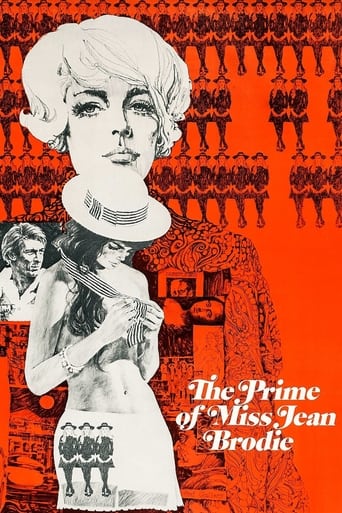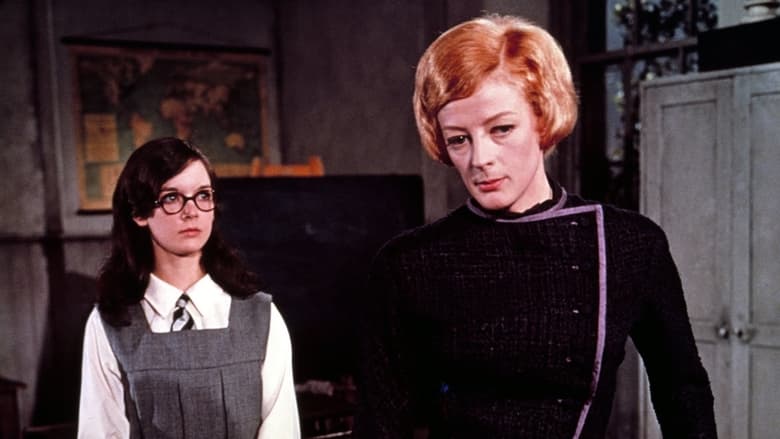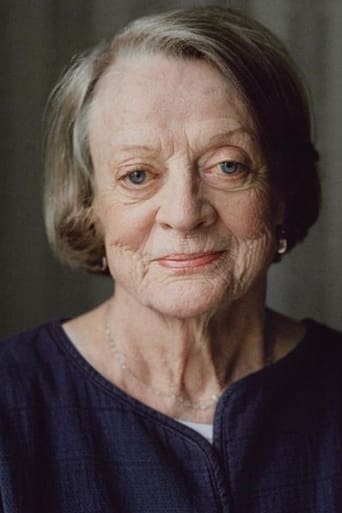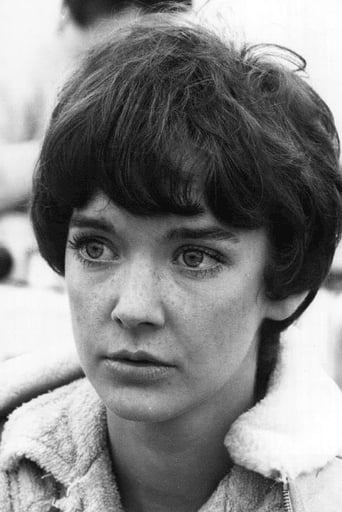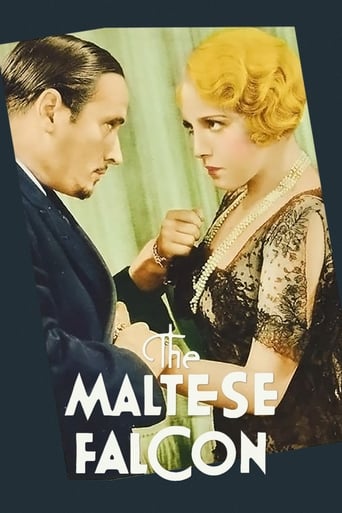The Prime of Miss Jean Brodie (1969)
A headstrong young teacher in a private school in 1930s Edinburgh ignores the curriculum and influences her impressionable 12-year-old charges with her over-romanticized worldview.
Watch Trailer
Cast
Similar titles
Reviews
Simply Perfect
People are voting emotionally.
Fantastic!
Excellent, Without a doubt!!
In 1932 Edinburgh, exacting "Marcia Blaine School for Girls" teacher Maggie Smith (as Jean Brodie) arrives for work. Stylishly outfitted and attractively approaching spinster-hood, Miss Brodie enjoys sharing personal love stories with her students. Brodie does not adhere to the school's curriculum. She teaches an admiration of Benito Mussolini, the Fascist dictator. Brodie is available for sexual affairs with fellow teachers. She loves art teachers, like Robert Stephens (as Teddy Lloyd). She loves music teachers, like Gordon Jackson (as Gordon Lowther). Understandably, this irks headmistress Celia Johnson (as Emmaline Mackay)...Brodie selects a group of girls for special attention, taking them to lunch and the opera. She also encourages a sexual relationship between an ex-lover and one of - as she calls them - "My girls." In this film, the four singled out as Brodie favorites are: spectacled Pamela Franklin (as Sandy), stuttering Jane Carr (as Mary McGregor), pretty Diane Grayson (as Jenny) and histrionic Shirley Steedman (as Monica). While Brodie is polite, cultured and engaging, she is a truly wretched teacher...This film received some unfair criticism for its depiction of the lead character. Although the "Jean Brodie" character is toned-down from the original novel by Muriel Spark, her behavior is not celebrated. The admiration for Fascism was not uncommon in the 1930s. That this political system led to monstrous evil was unknown to Brodie; furthermore, it seduced entire nations of people. Within the four walls of a classroom, teachers are dictators. This fits Brodie's character perfectly. Her nature is part of the drama...And we are captivated...The story of "Jean Brodie" is a warning. Most important to the its success is a bewitching lead performance - and Maggie Smith delivers marvelously. She won a much-deserved "Academy Award" as "Best Actress" for her impersonation. Also extraordinary is the supporting role played by Ms. Franklin. That Franklin was not even recognized with an "Oscar" nomination is one of the organization's many glaring errors. While not looking quite 12-years old, Franklin received her well-earned "Supporting Actress" honor from the "National Board of Review". Although Smith is the driving force behind the film's success, all other personnel are excellent.********* The Prime of Miss Jean Brodie (2/24/69) Robert Neame ~ Maggie Smith, Robert Stephens, Pamela Franklin, Celia Johnson
Penetrating character studies work well in novels and on the stage, where the action may be concentrated in one location. They are not as often found in films, except where the "hero" is bigger than life or surrounded by lots of action as in such films as BRAVEHEART and LAWRENCE OF ARABIA. Rarely does a film do what Ronald Neame's THE PRIME OF MISS JEAN BRODIE does: shine a spotlight on a character and the small milieu in which she operates.Movies about charismatic teachers aren't new either, but in most cases the teacher is the clear hero of the story, inspiring his/her students to accomplish things they never dreamed they could. What sets PRIME apart is that Jean Brodie is a mass of internal and external contradictions whose effect on her pupils tends to turn out somewhat differently than she intends.Jean Brodie is a dreamer, somewhat of a narcissist, and takes pride in the influence she has over "her girls," who are known throughout the school as "the Brodie set." They take tea and dinner at her flat, they spend weekends with her at the home of the singing master Mr Lowther (Gordon Jackson), with whom Miss Brodie is having an affair but who later marries another woman. This affair is of particular interest because the students discover that it isn't the singing master that Brodie is in love with but the art master (Smith's then-husband Robert Stephens), with whom she slept once but refuses to continue the affair because he is a married man.Jean Brodie is a fascinating woman, warts and all. She brazens her way through life despite having some very wrong-headed ideas: she idolizes Mussolini and Hitler, and her admiration for Franco inspires one rather dim-witted girl to decamp and head off to fight for Franco, where she believes her brother to be. He is, in fact, fighting on the other side, and the girl is killed in a train wreck before she even gets there, never knowing her mistake.At bottom, what makes Jean Brodie the most interesting is that she chooses to teach at a highly conventional school where her ideas are almost universally frowned upon by the headmistress and the rest of the faculty (with the exception of the two males whom she manipulates). It is this fact that ends up being her undoing, as one student finally sees through her and confronts her with the truth about herself in a scene that positively shoots fireworks off the screen.Maggie Smith is magnificent; this is one of the greatest performances by a leading actress ever committed to film. She is aided and abetted by an astounding cast of superb actors, all of whom fit their roles so perfectly that we forget we are watching actors.The children are especially good here. The kids are always the riskiest part of making a film about a school; the results can be somewhat uneven as in DEAD POETS SOCIETY. Here, the "children" hold their own against the adult actors remarkably well, with special kudos going to Pamela Franklin for her brilliantly penetrating study of the girl who finally sees Miss Brodie for what she is.At the end of the day, I found it hard to come to a conclusion about Jean Brodie. She is obviously wrong-headed and stubborn about certain things, but she also encourages independent and critical thinking in her pupils at a time when conformity was the order of the day. The fact that her real agenda is to create a group of Brodie clones ("the crème de la crème," as Miss Brodie would have it) is one of the great ironies of both her character and the film itself. The other great irony is that the very philosophy of critical thinking that she imparts to "her girls" is precisely the force that eventually drives Sandy (Franklin) to betray her to the headmistress and thus cost her her position. The film ends with Sandy walking placidly away from her final confrontation with Jean, who rushes out the door of her classroom and shouts "Assassin!" twice at the girl's retreating back.In the novel, Jean Brodie's defeat is total; forced into "early retirement," she dies some few years later. But the Brodie of the novel is a good fifteen to twenty years older than the Brodie of the film (at thirty-five, Smith was herself definitely in her own prime, which informs her characterization), and while her fate is left to the imagination of the audience, it is hard to believe that Jean's defeat is total and one suspects that with her strength of will she would eventually come out on top in the end. Possibly she might have to leave Edinburgh and seek a post elsewhere, but it seems certain that she would think of something.This is really a film for people who like to watch great actors ply their craft. Smith strikes all the right notes; she is to acting what Paderewski was to the piano. And the supporting cast is the orchestra that makes this concerto unforgettable.Note: This one rewards multiple viewings.
I can't even put words on this movie. It's too much. If ever there was a film "before it's time" it's this. The level of depravity, insight and emotional power is different from anything else I have seen. It's almost unrateable, but a 10/10 should do.Maggie Smith(who deserved her Oscar!!!!!!!!!!) plays a teacher so obviously deranged but still so human. In fact all the main characters in this film are humans in their purest form: FLAWED, but not directly evil. The characters, no matter how devious do believe to be in the right, and they often are.From the revolutionary fascist snob who considers herself the best example of humanity and has the depravity to try to form the girls in her own image and after her own sickly plans also teaches them individualism and to fight for what they believe. The black hearted, spiteful and utterly conservative Christian principle Miss MacKay(Celia Johnson) do at heart have more or less good intentions, at least in regard to the children. Oh and to make it clear the film is not about the struggle between these characters but rather about life.Beyond any doubt Ronald Neames greatest effort, and this is the director who made The Man Who Never Was. It doesn't even compare in greatness, nor impact. This is just extraordinary. It's a unique power to manage to make such a portrait were nobody are really in the right and despite huge flaws such as fascism, prejudice, adultery, weakness, spitefulness and to some extent even pedophilia they are still likable. This is not only a powerhouse of performances. I need to point out how amazing Pamela Franklin was as well!!!! But also a powerhouse of emotions and uncertainty. In essence, truly human.
"Give me a girl at an impressionable age and she is mine for life!" - Miss Jean BrodieSet in 1930s Scotland, "The Prime of Miss Jean Brodie" stars Maggie Smith as Miss Jean Brodie, an eccentric but charming teacher who works at a private Edinburgh school. Like most cinematic mentors, Miss Brodie inspires her students to "live life to the fullest", passionately teaching them about art and history, and urging them to embrace the kind of wild liberalism that was just beginning to be embraced by 1960s Britain, the decade in which the film was released. Needless to say, the students and male members of the school all love Miss Brodie. A ditsy feminist before the term was even invented, Miss Brodie picks six of her favourite students (the Brodie set) and moulds them into models of herself, or rather, how she wishes herself to be. She undermines the school curriculum, brings her personal and academic passions to the classroom, and seduces her kids with the possibility of a kind of joyous progressivism.In other words, the first half of this film is the typical "noble teacher" cliché, in which a ridiculously non-conformist teacher inspires kids to "be all they can be" through a variety of offbeat teaching methods. Gradually, however, Miss Brodie begins to defend fascism, and the film takes on an increasingly darker tone. The now autocratic, orderly and foolish Miss Brodie becomes infatuated with Mussolini and Hitler, praising fascism and treating it as a sign of cultivation. Deluded by the appeal of absolute domination, with its apparent order and efficiency, Miss Brodie forgets that each person, however lowly, is a human being with rights. This results in one of Brodie's students (an artist called Sandy) rebelling against Brodie's attempts to "mould her". Whilst throughout the film Brodie attempts to sculpt each student, bending their personalities to her will, Sandy displays powers that Brodie didn't know she possessed. Powers which resist and shatter Brodie's monomaniacal control.At first glance, the film seems to be concerned with how modern women and girls operate or rebel inside closed systems of surveillance and control. Indeed, fascism was, in many ways, an anti-feminist ideology. In Italy, Benito Mussolini campaigned to return women to the family home, insisting that Italian birth-rates were too low. Contraception was banned and feminism described as a "Jewish" invention. Likewise, within Hitler's party, women made up just six percent of the membership and were given incentives to stay at home. The British Union of Fascists may have been more sympathetic to women than its sister parties, and a minority of its writers did accept that women might have a right to work, yet even here, the party as a whole was eugenicist, fixated with increased birth-rates, and opposed to women's independence. In each case, in glorifying traditional images of women, fascist society was hierarchical, with an emphasis and idealization of virility, with women maintaining a largely subordinate position to men.But the school at which Miss Brodie teaches is different from what we might customarily identify as an official fascist hub. It is not an authoritarian college in the midst of a fascist nation, but rather a private school for girls in Edinburgh. Furthermore, the school is run by a woman and the liberal community in which the school is based, is itself composed primarily of women. This complicates things entirely.What the film seems to asks is why followers invested fascism with a rebellious capacity to break up a sedimented status quo, and why some female subjects attributed to it a capacity for radical departures from patriarchal conceptions of womanhood. Also, the film seems less concerned about European fascism than it is in juxtaposing Miss Brodie's vague approach to feminism with that of British fascism embedded in a more liberal democratic context. That is, in the liberal sixties, the kind of rampant, glorified feminism that Brodie represents (the school principal is shocked to see Brodie's 11 year old students highly knowledgeable about sexuality), itself exerts a kind of authoritarian pressure on womanhood. What the film advocates is a kind of scepticism and personal choice. Because it is never made clear whether Miss Brodie herself got crazier or whether her girls simply couldn't recognise her quirks before, both the students, and we the audience, are ultimately asked to put no one on a pedestal. To test our idols, no matter how correct (and seductive) they may seem.8.9/10 – Many British films of this era either mocked pre WW2 British values (and praised a kind of swinging 60s freedom and promiscuity), or crafted themselves as cautionary tales warning against the dangers of such new found liberty. "The Prime of Miss Brodie" covers the same terrain but offers no easy answers.Beyond this, the film works well as a very dark drama with an interesting central performance by Maggie Smith. "Dead Poet's Society" would rip this film's plot off, wholesale.Worth two viewings.
